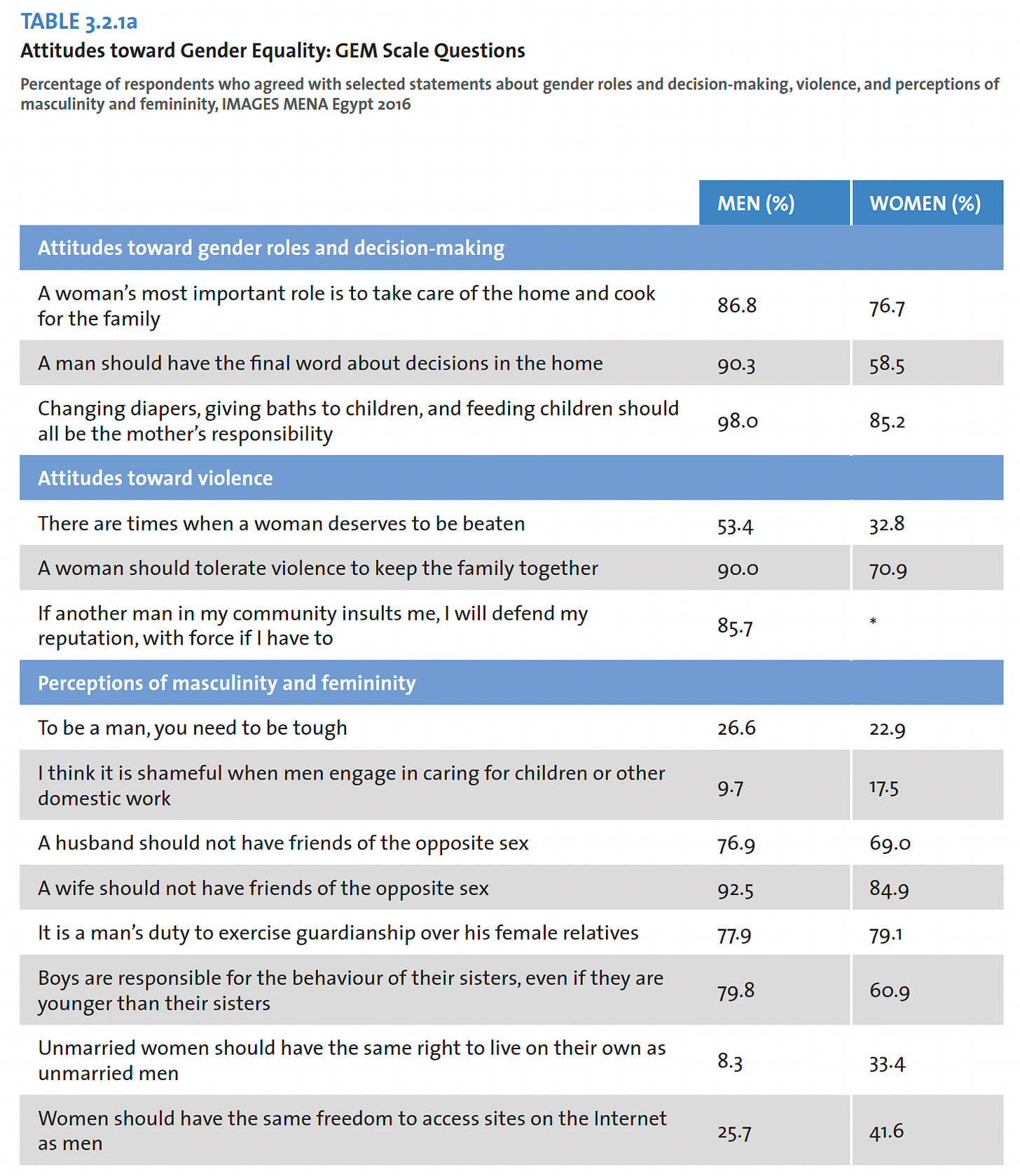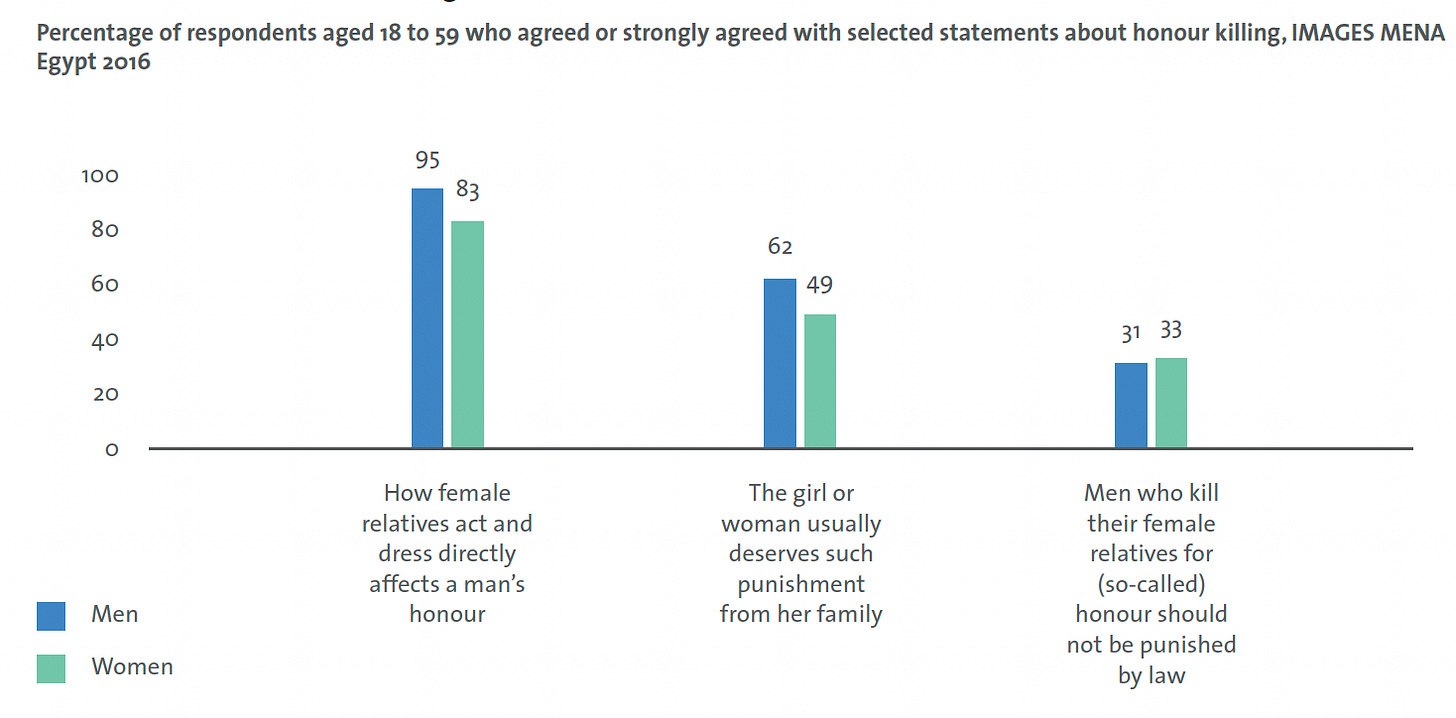Can Social Media undo Sexism?
Egypt is one of the most patriarchal countries in the world. 90% of men say that ‘a woman should tolerate violence to keep the family together’. 70% of women concur. Entrenched sexism perpetuates female seclusion and thereby obstructs female solidarity. Women who speak out continue to be punished, under patriarchal authoritarianism.
A new paper in Nature examines whether these attitudes can be changed through social media messaging. Before getting to their data, let’s first understand the context.
Male honour
Male honour is primary, and it depends on female chastity. 86% of men are so concerned about their reputation that they would, hypothetically, defend it by force. 95% of men say that their honour is affected by their female relatives’ clothing and behaviour. A third say that honour-killings should go unpunished.
Young Egyptian men are just as likely to endorse patriarchy as their grandfathers
The table below aggregates the above gender beliefs and creates a scale of 0-3. Whether rich or poor, rural or urban, young or old, there is very little difference in men’s gender beliefs. Patriarchy is extremely entrenched.
Egyptian husbands overwhelmingly say they control their wives’ movements, decide what they wear, and expect sex on demand.
Violence is widespread - in both private and public
A third of Egyptians were beaten at home with an object; over two thirds were beaten by their teachers.
On Facebook, the following meme was shared by two Egyptian accounts, each with over a million followers. Translation: “My wife when she tells me that she’s not obliged to wear the hijab”.
Sexual harassment is widespread, and women are blamed.
Psychologically, 40% of Egyptian women report crying spells, nausea, loneliness, fear, depression and low appetite.
Egypt is caught in what I call a ‘Patrilineal Trap’
Men’s honour is maintained through female seclusion, this removes any and all rumours of female impropriety. Given weak job-creation and low available earnings, there is little pecuniary incentive for female employment. Families would rather safeguard their reputations. Egypt has one of the lowest rates of female labour force participation in the world.
Under authoritarianism, Al-Sisi has repressed feminist activism. Feminist NGOs have been under travel-bans and have had their assets frozen. Courts continue to punish women for impropriety, legitimising victim-blaming. As observed by Salma El Hosseiny:
In 2020, at least nine women [were] arrested and charged with ‘violating Egyptian family values’. In July 2020, at least three women were sentenced to 2 to 3 years imprisonment and fined 300,000 EGP (roughly $19,000) for their social media content (singing and dancing to pop songs on TikTok). The Prosecution's statement announcing the arrest of women social media influencers laid out the charges, which included ‘sexually arousing men’ by ‘singing and dancing in a way that attracts attention’ which has threatened ‘national and social security’, ‘corrupted our society and values’.
A culture of honour is thus reinforced from the top-down and bottom-up. Most Egyptian women remain secluded, surveilled and reliant on patriarchal guardians. They have little opportunity to gather with other women and critically reflect on prevailing inequalities.
Can social media erode sexism?
A new paper in Nature (by Fotini Christia, Horacio Larreguy, Elizabeth Parker-Magyar and Manuel Quintero) examines the effectiveness of gender sensitisation. An Egyptian women’s right organisation provided two months of edutainment about gender-based violence via WhatsApp, Facebook and Television. Participants received regular reminders, which indeed prompted them to watch.
Did it work?
No. Women who received the content were no more likely to condemn yelling, endorse marital equality or expect equal decision-making.
Even if an Egyptian feminist preaches about gender equality, it falls flat.
I am not surprised.
Failure is exactly what we should expect, given Egypt’s Patrilineal Trap.
Male honour remains primary
Given weak job-growth, earnings are low
85% of women are at home
Even if she became critical, exit options are weak
Single women are shamed
Peers continue to normalise male violence, and
Authoritarian government cracks down on dissent.
Patriarchy is not easily fixed.














I have learned so much from your posts. I love the data-rich analysis. I have a question: isn’t the term ”male honor” very biassed by patriarchal thinking? Isn’t ”male insecurity” a more accurate word? Wouldn’t the use of the term ”male insecurity” instead of ”male honor” possibly have an eroding effect on this way of thinking in highly patriarchical societies?
Excellent work, as always. But given this, "Given weak job-creation and low available earnings, there is little pecuniary incentive for female employment." why not explore the importance of liberalizing the economy to accelerate job creation?
Sadly I'm not surprised that the social media initiative failed. But over time, if there was a rapidly growing economy with associated wage growth and increased female labor force participation, I'd expect gender attitudes to change.
Some time ago I was comparing the claim that education improved conditions for women vs. labor force participation. Egypt stood out as having highly educated women for its stage of development but very low labor force participation. Education of women without labor force participation (and thus financial and social independence for women) is weak sauce.